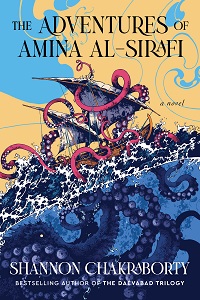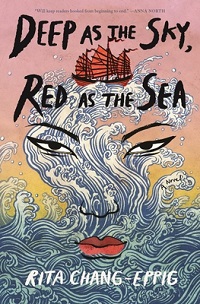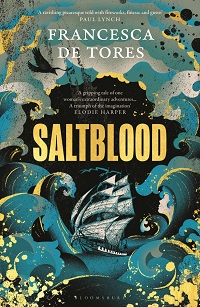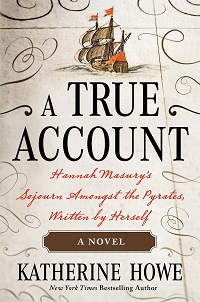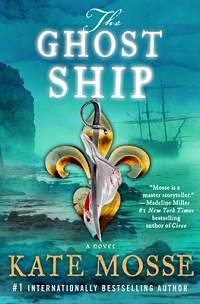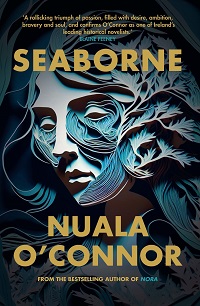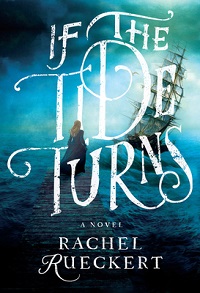Mary I, England’s first true queen regnant, isn’t generally recognized for her admirable steadfastness, like her mother Catherine of Aragon, or her canny survival instinct, like her half-sister, Elizabeth I, although she exhibited both these qualities. Instead, due to her zealous persecution of Protestants, the sobriquet "Bloody Mary" clings to her. Her actions make her a challenging fiction subject, but Tudor expert Weir (The King’s Pleasure, 2023) dexterously humanizes this polarizing figure.
Following a cosseted childhood as Henry VIII’s elder daughter, Mary gets sidelined during her father’s pursuit of Anne Boleyn and break with Rome. Mary’s health suffers during many stressful years, and Weir casts a sympathetic light on Mary as she endures demotion and disinheritance, relying on her supporters and Catholic faith. But following her triumphant coronation, her marriage to Philip of Spain and cruel religious intolerance make her extremely unpopular.
Weir aptly demonstrates how politics and personal relationships intermix via Elizabeth’s transformation, in Mary’s eyes, from beloved sister to dangerous rival. Mary’s passionate spirit, which is stubbornly and tragically misdirected, comes alive via Weir’s thorough approach.
The Passionate Tudor was published by Ballantine (US/Canada) this week, and by Hodder Headline in the UK on May 9, under the title Mary I: Queen of Sorrows. I wrote this review for the April 15th issue of Booklist.
This is the third novel in a loose trilogy following three generations of Tudors: Henry VIII (The King's Pleasure) and his mother (The Last White Rose) and eldest daughter. Other historical novelists have written about Mary I, but none very recently. Suzannah Dunn's The Queen's Sorrow appeared in 2009, likewise Julianne Lee's Her Mother's Daughter, both at a time when Tudor fiction was in vogue. Having finished this series, I'm curious to see what Alison Weir will write next.
Thursday, May 30, 2024
Saturday, May 25, 2024
Historical fiction trendspotting: Sail the world with these recent and upcoming pirate novels
Ahoy there! Has anyone else noticed the number of historical fiction about pirates appearing lately? There are enough of them to warrant some notice. Besides the exciting storylines, another attractive angle to these books is that they're anchored in historical settings you don't often see. Many of them deal with female pirates: some completely fictional, others based in legend. Below are eight that came out in the past year or so. Looking ahead to the future, you'll see more, including Ariel Lawhon's next novel The Pirate Queen, about 16th-century Irish chieftain Grace O'Malley; and Rachel Rueckert's The Determined, about Anne Bonny and Mary Read, which is out from Kensington in 2025.
Briony Cameron's debut novel is based on the legend of Jacquotte Delahaye, a biracial woman of color from Saint-Domingue who reportedly became a pirate captain in the 17th-century Caribbean. Atria, June 2024.
Immerse yourself in the political and cultural world of the Indian Ocean in the 12th century, full of bustling international trade and dangerous threats, in Chakraborty's historical fantasy novel. First in a series, it sees the title character—a widow, mother, and former pirate—tempted into one more adventure at sea. Harper Voyager, February 2023.
The South China Sea in the 19th century is the setting for this debut about a pirate queen of legend, Shek Yeung, and the risks she takes to solidify power in a patriarchal world. Bloomsbury, May 2023.
De Tores (who also writes as Francesca Haig) dives into the life story of Mary Read, who recounts her adventurous life, from her childhood, when she was raised as a boy, through her later years as a notorious pirate. Bloomsbury UK, April 2024.
Howe (The Physick Book of Deliverance Dane) writes an exciting tale about Hannah Masury, an indentured servant who flees 18th-century Boston and dons a disguise as a cabin boy about a pirate ship. In a parallel timeline, a 1930s-era researcher uncovers Hannah's story. Henry Holt, November 2023.
Part three in her Joubert Family Chronicles, Mosse's The Ghost Ship tells a story about a vessel of secrets, romance, and piracy that moves from Europe to the Barbary Coast in the 1620s. Minotaur, July 2023.
The swashbuckling tale of Anne (Coleman) Bonny, a young woman from Ireland's County Cork who immigrates to America in the early 18th century with her family and turns to a life of the sea on a quest for freedom and adventure. New Island Books, April 2024.
Based on the legend of pirate Samuel Bellamy, Rueckert's debut is an adventurous star-crossed love story about Sam, an orphaned sailor from Cape Cod, and the woman he loves, Maria Brown, whose affluent family refuses to entertain Sam as a suitor for her. Kensington, March 2024.
Briony Cameron's debut novel is based on the legend of Jacquotte Delahaye, a biracial woman of color from Saint-Domingue who reportedly became a pirate captain in the 17th-century Caribbean. Atria, June 2024.
Immerse yourself in the political and cultural world of the Indian Ocean in the 12th century, full of bustling international trade and dangerous threats, in Chakraborty's historical fantasy novel. First in a series, it sees the title character—a widow, mother, and former pirate—tempted into one more adventure at sea. Harper Voyager, February 2023.
The South China Sea in the 19th century is the setting for this debut about a pirate queen of legend, Shek Yeung, and the risks she takes to solidify power in a patriarchal world. Bloomsbury, May 2023.
De Tores (who also writes as Francesca Haig) dives into the life story of Mary Read, who recounts her adventurous life, from her childhood, when she was raised as a boy, through her later years as a notorious pirate. Bloomsbury UK, April 2024.
Howe (The Physick Book of Deliverance Dane) writes an exciting tale about Hannah Masury, an indentured servant who flees 18th-century Boston and dons a disguise as a cabin boy about a pirate ship. In a parallel timeline, a 1930s-era researcher uncovers Hannah's story. Henry Holt, November 2023.
Part three in her Joubert Family Chronicles, Mosse's The Ghost Ship tells a story about a vessel of secrets, romance, and piracy that moves from Europe to the Barbary Coast in the 1620s. Minotaur, July 2023.
The swashbuckling tale of Anne (Coleman) Bonny, a young woman from Ireland's County Cork who immigrates to America in the early 18th century with her family and turns to a life of the sea on a quest for freedom and adventure. New Island Books, April 2024.
Based on the legend of pirate Samuel Bellamy, Rueckert's debut is an adventurous star-crossed love story about Sam, an orphaned sailor from Cape Cod, and the woman he loves, Maria Brown, whose affluent family refuses to entertain Sam as a suitor for her. Kensington, March 2024.
Saturday, May 18, 2024
Restoration-era intrigue and sisterhood in Nicola Cornick's multi-period The Other Gwyn Girl
Raise your hand if you realized royal mistress Nell Gwyn had an older sister. If not, you’re not alone. Nicola Cornick has a knack for taking interesting women from history’s sidelines, digging into the limited facts on their lives, and weaving them into compelling dual-narrative plots.
In this highly diverting romantic caper, Rose Gwyn has gotten herself in a muddle. It’s 1671, and she’s been languishing in London’s grimy Marshalsea Prison for six weeks after being arrested as an accessory to her highwayman husband John’s theft of the crown jewels. Pregnant and despondent – and illiterate – Rose asks her jailer to scribe a note to her sister Nell, theatrical darling and Charles II’s beloved, begging to be freed. Nell comes to her rescue but has motives beyond sibling affection. Perpetually worried about money after the sisters’ impoverished childhood, Nell had plans for the stolen jewels herself, but they have mysteriously disappeared.
The parallel narrative, set today, involves librarian Jess Yates, forced to relaunch her life after her fraudster ex-boyfriend’s deceptions. She lands in rural Berkshire, working as housekeeper for her sister Tavy, a celebrity influencer whose latest reality TV series follows the restoration of “Fortune Hall,” a manor where legends about the Gwyn family still circulate.
Compared with Rose’s Restoration-era tale of dangerous conspiracies and betrayals, Jess’s story could have felt lightweight and ignorable, and it’s to Cornick’s credit that it isn’t. With the help of Ethan, a historic building consultant, Jess begins exploring the house’s shadowy centuries-old history; fans of Lauren Belfer’s Ashton Hall will enjoy her research journey. One of the novel’s love stories develops too fast, a small flaw in a well-constructed tale of two independent women and the complexities of sisterhood. This story stands alone, but the author’s fans will note cameos of characters and places from her earlier novels.
The Other Gwyn Girl was published by the UK's Boldwood Books in March; I reviewed it initially for May's Historical Novels Review. For US readers, I just noticed that the book is 99 cents on Kindle (not sure how long this will last!), and Amazon Prime members can read it for free in their Prime library.
In this highly diverting romantic caper, Rose Gwyn has gotten herself in a muddle. It’s 1671, and she’s been languishing in London’s grimy Marshalsea Prison for six weeks after being arrested as an accessory to her highwayman husband John’s theft of the crown jewels. Pregnant and despondent – and illiterate – Rose asks her jailer to scribe a note to her sister Nell, theatrical darling and Charles II’s beloved, begging to be freed. Nell comes to her rescue but has motives beyond sibling affection. Perpetually worried about money after the sisters’ impoverished childhood, Nell had plans for the stolen jewels herself, but they have mysteriously disappeared.
The parallel narrative, set today, involves librarian Jess Yates, forced to relaunch her life after her fraudster ex-boyfriend’s deceptions. She lands in rural Berkshire, working as housekeeper for her sister Tavy, a celebrity influencer whose latest reality TV series follows the restoration of “Fortune Hall,” a manor where legends about the Gwyn family still circulate.
Compared with Rose’s Restoration-era tale of dangerous conspiracies and betrayals, Jess’s story could have felt lightweight and ignorable, and it’s to Cornick’s credit that it isn’t. With the help of Ethan, a historic building consultant, Jess begins exploring the house’s shadowy centuries-old history; fans of Lauren Belfer’s Ashton Hall will enjoy her research journey. One of the novel’s love stories develops too fast, a small flaw in a well-constructed tale of two independent women and the complexities of sisterhood. This story stands alone, but the author’s fans will note cameos of characters and places from her earlier novels.
The Other Gwyn Girl was published by the UK's Boldwood Books in March; I reviewed it initially for May's Historical Novels Review. For US readers, I just noticed that the book is 99 cents on Kindle (not sure how long this will last!), and Amazon Prime members can read it for free in their Prime library.
Monday, May 13, 2024
The Great Divide by Cristina Henríquez unites a diverse cast of people during the Panama Canal's construction
The Great Divide is the epic novel of the Panama Canal’s construction you didn’t know you’d been missing. This major engineering feat of the early 20th century linked the Atlantic and Pacific Oceans, making international shipping more efficient, but its excavation caused untold hardships for Panama’s people. With this event as a backdrop, Henríquez brings together a large cast whose lives are transformed by it.
Among them are Ada Bunting, an enterprising young Barbadian woman who stows away aboard a steamer to Panama, hoping to earn enough money there to pay for surgery for her ill sister back home. Omar Aquino, a fisherman’s son, seeks adventure and community in signing on as a laborer for the canal, but his decision provokes his father, who hates seeing his country torn up by outsiders, to give him the silent treatment. A caring woman with botanical expertise, Marian Oswald has accompanied her scientist husband, John, from Tennessee in support of his dream of eradicating malaria but finds herself isolated and lonely.
The viewpoint is deliberately inclusive and moves from familiar perspectives to new ones with ease, introducing characters like Ada’s proudly independent mother in Barbados; the fishmonger Joaquín and wife Valentina, whose childhood home at Gatún is the rumored site of a proposed dam; and the Oswalds’ cook, Antoinette, who sends funds back to her children in Antigua.
Henríquez’s style resembles Ken Follett’s in its smoothness and approachability, though her cast is more culturally diverse, the scope not as sprawling, and she avoids crazy coincidences in gathering the different threads together. The novel is a stellar example of how historical novels can bring lesser-known voices to the surface, emphasizing how every person has a story worth listening to.
Among them are Ada Bunting, an enterprising young Barbadian woman who stows away aboard a steamer to Panama, hoping to earn enough money there to pay for surgery for her ill sister back home. Omar Aquino, a fisherman’s son, seeks adventure and community in signing on as a laborer for the canal, but his decision provokes his father, who hates seeing his country torn up by outsiders, to give him the silent treatment. A caring woman with botanical expertise, Marian Oswald has accompanied her scientist husband, John, from Tennessee in support of his dream of eradicating malaria but finds herself isolated and lonely.
The viewpoint is deliberately inclusive and moves from familiar perspectives to new ones with ease, introducing characters like Ada’s proudly independent mother in Barbados; the fishmonger Joaquín and wife Valentina, whose childhood home at Gatún is the rumored site of a proposed dam; and the Oswalds’ cook, Antoinette, who sends funds back to her children in Antigua.
Henríquez’s style resembles Ken Follett’s in its smoothness and approachability, though her cast is more culturally diverse, the scope not as sprawling, and she avoids crazy coincidences in gathering the different threads together. The novel is a stellar example of how historical novels can bring lesser-known voices to the surface, emphasizing how every person has a story worth listening to.
The Great Divide appeared from Ecco/HarperCollins in March, and I'd reviewed it from an Edelweiss copy for the Historical Novels Review's May issue. Fourth Estate is the UK publisher. The novel was a Read with Jenna book club pick. A Spanish-language edition, Entre Dos Aguas, translated by Martha Celis-Mendoza, will be out in August.
Thursday, May 09, 2024
Bits and pieces of historical fiction news: awards, reviews, and more
A short roundup of recent news about historical novels and their authors.
Jayne Anne Phillips' Night Watch, set in rural West Virginia during and after the US Civil War, was named the winner for the Pulitzer Prize for Fiction on May 6th. I had reviewed it last year, and it's nice to see a historical novel get such a prestigious honor. The announcement in Publishers Lunch (can't link to it as it's behind a paywall) mentioned that up until now, Night Watch had sold fewer than 4000 hardcover copies, a modest number. Safe to say that many libraries and individual readers will be adding it to their collections now. It was also longlisted for the National Book Award. The Washington Post review, by Wendy Smith, which called it "beautiful, mournful," is very positive (with one quibble that I happen to agree with). Dwight Garner's New York Times review is decidedly less so. The literary style won't appeal to everyone, but in reading multiple reviews, you can get a sense of whether a novel will suit your tastes or not. Then, if you want to read more about authors and reviews, I recommend Jennifer Weiner's Substack post on the topic, "Revenge of the Panned."
The 2024 Walter Scott Prize shortlist is out, with six historical novels under contention:
I've added the US publishers if they exist. The only one I've read so far is In the Upper Country, centering on an Underground Railroad hub in what's now Ontario in 1859, and my takeaway was "while [it] isn’t an effortless read, it makes an original and valuable contribution to the historical fiction genre." The winner will be announced on June 13th.
The category shortlists for the Historical Novel Society's First Chapters competition were announced on Monday. This award is for the first three chapters of an unpublished historical fiction work.
Bestselling historical crime writer C. J. Sansom passed away on April 27th after a lengthy illness, and his fans, peers, and publisher have been posting their remembrances. Among the most moving is that written by his friend Rear Admiral John Lippiett, Chief Executive of the Mary Rose Trust, speaking about how he came to meet the author and read his works, and his personal experience with Sansom's thorough research into Tudor politics and life over the course of his novels.
On her Substack, Alina Adams shares details about sales and earnings for her newest historical novel, My Mother's Secret: A Novel of the Jewish Autonomous Region, which came out with the micro-press History Through Fiction. This will be an informative post not just for readers curious about the historical fiction market, but also (and especially) for authors interested in publishing with smaller presses and wanting to know what to expect. Spoiler alert: the total sales numbers have been very good.
Jayne Anne Phillips' Night Watch, set in rural West Virginia during and after the US Civil War, was named the winner for the Pulitzer Prize for Fiction on May 6th. I had reviewed it last year, and it's nice to see a historical novel get such a prestigious honor. The announcement in Publishers Lunch (can't link to it as it's behind a paywall) mentioned that up until now, Night Watch had sold fewer than 4000 hardcover copies, a modest number. Safe to say that many libraries and individual readers will be adding it to their collections now. It was also longlisted for the National Book Award. The Washington Post review, by Wendy Smith, which called it "beautiful, mournful," is very positive (with one quibble that I happen to agree with). Dwight Garner's New York Times review is decidedly less so. The literary style won't appeal to everyone, but in reading multiple reviews, you can get a sense of whether a novel will suit your tastes or not. Then, if you want to read more about authors and reviews, I recommend Jennifer Weiner's Substack post on the topic, "Revenge of the Panned."
The 2024 Walter Scott Prize shortlist is out, with six historical novels under contention:
The New Life by Tom Crewe (Chatto & Windus/Scribner)
Hungry Ghosts by Kevin Jared Hosein (Bloomsbury/Ecco)
My Father's House by Joseph O’Connor (Harvill Secker/Europa)
In the Upper Country by Kai Thomas (Viking Canada/Viking US/John Murray)
Absolutely and Forever by Rose Tremain (Chatto & Windus/no US edition)
The House of Doors by Tan Twan Eng (Canongate/Bloomsbury US)
I've added the US publishers if they exist. The only one I've read so far is In the Upper Country, centering on an Underground Railroad hub in what's now Ontario in 1859, and my takeaway was "while [it] isn’t an effortless read, it makes an original and valuable contribution to the historical fiction genre." The winner will be announced on June 13th.
The category shortlists for the Historical Novel Society's First Chapters competition were announced on Monday. This award is for the first three chapters of an unpublished historical fiction work.
Bestselling historical crime writer C. J. Sansom passed away on April 27th after a lengthy illness, and his fans, peers, and publisher have been posting their remembrances. Among the most moving is that written by his friend Rear Admiral John Lippiett, Chief Executive of the Mary Rose Trust, speaking about how he came to meet the author and read his works, and his personal experience with Sansom's thorough research into Tudor politics and life over the course of his novels.
On her Substack, Alina Adams shares details about sales and earnings for her newest historical novel, My Mother's Secret: A Novel of the Jewish Autonomous Region, which came out with the micro-press History Through Fiction. This will be an informative post not just for readers curious about the historical fiction market, but also (and especially) for authors interested in publishing with smaller presses and wanting to know what to expect. Spoiler alert: the total sales numbers have been very good.
Saturday, May 04, 2024
Kelly E. Hill's A Home for Friendless Women is based on original research into Victorian-era Louisville
Kelly E. Hill’s debut reads like a living, breathing scrapbook about the women from the titular Home, a religious organization from late 19th-century Louisville, Kentucky, that took in unwed pregnant women, attempting to instill them with godly virtues while persuading them to discard their “sinful” ways. Of course, what constitutes sin is in the beholder’s eye, and the line between the oppressed and their female oppressors often hinges on an unfortunate quirk of fate.
In 1878, a brilliant former Oberlin College student named Ruth arrives at the Home after an unknown man sexually assaults her in the campus museum – a place where women students were permitted to clean but not use the microscopes. With nowhere else to go, Ruth puts up with the founders’ obnoxious moralizing, but shocking events have her worrying about the other girls and their babies.
Eleven years later, we hear from the witty Belle Queeney, who left the brothel several blocks away after she fell pregnant. Belle’s tireless work ethic threatens to make the other “inmates” look bad, but she knows her worth even if society calls her a fallen woman. Belle dreams of reuniting with her lover, Rose, who has gone missing.
And in 1901, the founders’ daughter Minnie Davidson, now a fortyish wife and mother, uncovers a past scandal at the Home just in time for its 25th anniversary celebration. Their accounts appear chronologically, a technique that allows mysteries to build.
Delighting in research but never weighed down by it, Hill’s novel is based around cryptic mentions from the Home’s actual minute books (“Two women have been sent to City Hospital, one to Insane Asylum, one expelled”), transforming these long-silenced individuals into memorable characters, alongside primary source snippets and informative footnotes. Echoing with themes of human dignity, bodily autonomy, and the rights all women deserve, this wise and compassionate work is completely absorbing.
A Home for Friendless Women was published by Vintage in March, and I reviewed it for May's Historical Novels Review. This novel hasn't gotten the attention it deserves! If not for a review in Booklist, I wouldn't have realized this book was available; afterward, I found it on NetGalley and requested it. And yes, there are footnotes. They often don't work well within historical novels, but I had no problem with them in this one.
In 1878, a brilliant former Oberlin College student named Ruth arrives at the Home after an unknown man sexually assaults her in the campus museum – a place where women students were permitted to clean but not use the microscopes. With nowhere else to go, Ruth puts up with the founders’ obnoxious moralizing, but shocking events have her worrying about the other girls and their babies.
Eleven years later, we hear from the witty Belle Queeney, who left the brothel several blocks away after she fell pregnant. Belle’s tireless work ethic threatens to make the other “inmates” look bad, but she knows her worth even if society calls her a fallen woman. Belle dreams of reuniting with her lover, Rose, who has gone missing.
And in 1901, the founders’ daughter Minnie Davidson, now a fortyish wife and mother, uncovers a past scandal at the Home just in time for its 25th anniversary celebration. Their accounts appear chronologically, a technique that allows mysteries to build.
Delighting in research but never weighed down by it, Hill’s novel is based around cryptic mentions from the Home’s actual minute books (“Two women have been sent to City Hospital, one to Insane Asylum, one expelled”), transforming these long-silenced individuals into memorable characters, alongside primary source snippets and informative footnotes. Echoing with themes of human dignity, bodily autonomy, and the rights all women deserve, this wise and compassionate work is completely absorbing.
A Home for Friendless Women was published by Vintage in March, and I reviewed it for May's Historical Novels Review. This novel hasn't gotten the attention it deserves! If not for a review in Booklist, I wouldn't have realized this book was available; afterward, I found it on NetGalley and requested it. And yes, there are footnotes. They often don't work well within historical novels, but I had no problem with them in this one.
Subscribe to:
Comments (Atom)







